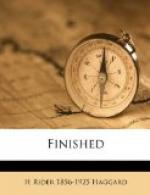Now, I wondered to myself, what is there of value that one who does not eat sweets would stow away in his mouth. Gold coin perhaps, or a quid of tobacco, or a stone. Gold was too much to pay for a bottle of gin, tobacco was too little, but how about the stone? What stone? Who wanted stones? Then suddenly I remembered that these people were said to come from Kimberley, and whistled to myself. Still I did nothing, principally because the mist was still so dense that although I could see the men’s faces, I could not clearly see the articles which they passed to each other about two feet lower, where it still lay very thickly, and to bring any accusation against a native which he can prove to be false is apt to destroy authority. So I held my tongue and waited my chance. It did not come at once, for before I was dressed those Basutos had departed together with their leader Karl, for now that the sun was up they no longer feared the haunted bush.
It came later, thus: We were trekking along between the thorns upon a level and easy track which enabled the driver Footsack to sit upon the “voorkisse” or driving box of the wagon, leaving the lad who is called the voorlooper to lead the oxen. Anscombe was riding parallel to the wagon in the hope of killing some guineafowl for the pot (though a very poor shot with a rifle he was good with a shot-gun). I, who did not care for this small game, was seated smoking by the side of Footsack who, I noted, smelt of gin and generally showed signs of dissipation. Suddenly I said to him—
“Show me that diamond which the Bastard Karl gave you this morning in payment for the bottle of your master’s drink.”
It was a bow drawn at a venture, but the effect of the shot was remarkable. Had I not caught it, the long bamboo whip Footsack held would have fallen to the ground, while he collapsed in his seat like a man who has received a bullet in his stomach.
“Baas,” he gasped, “Baas, how did you know?”
“I knew,” I replied grandly, “in the same way that I know everything. Show me the diamond.”
“Baas,” he said, “it was not the Baas Anscombe’s gin, it was some I bought in Pilgrim’s Rest.”
“I have counted the bottles in the case and know very well whose gin it was,” I replied ambiguously, for the reason that I had done nothing of the sort. “Show me the diamond.”
Footsack fumbled about his person, his hair, his waistcoat pockets and even his moocha, and ultimately from somewhere produced a stone which he handed to me. I looked at it, and from the purity of colour and size, judged it to be a diamond worth #200, or possibly more. After careful examination I put it into my pocket, saying,
“This is the price of your master’s gin and therefore belongs to him as much as it does to anybody. Now if you want to keep out of trouble, tell me—whence came it into the hands of that man, Karl?”
“Baas,” replied Footsack, trembling all over, “how do I know? He and the rest have been working at the mines; I suppose he found it there.”




